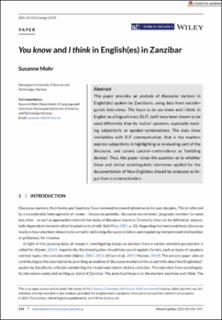| dc.contributor.author | Mohr, Susanne | |
| dc.date.accessioned | 2022-02-16T10:00:11Z | |
| dc.date.available | 2022-02-16T10:00:11Z | |
| dc.date.created | 2021-03-06T09:14:57Z | |
| dc.date.issued | 2021 | |
| dc.identifier.citation | World Englishes. 2021, 40 (4), 534-547. | en_US |
| dc.identifier.issn | 0883-2919 | |
| dc.identifier.uri | https://hdl.handle.net/11250/2979297 | |
| dc.description.abstract | This paper provides an analysis of discourse markers in English(es) spoken by Zanzibaris, using data from sociolinguistic interviews. The focus is on you know and I think. In English as a lingua franca (ELF), both have been shown to be used differently than by ‘native’ speakers, especially marking subjectivity or speaker-centeredness. The data show similarities with ELF communication, that is the markers express subjectivity in highlighting or evaluating part of the discourse, and convey speaker-centeredness as ‘fumbling devices’. Thus, the paper raises the question as to whether these and similar sociolinguistic interviews applied for the documentation of New Englishes should be analyzed as lingua franca communication. | en_US |
| dc.language.iso | eng | en_US |
| dc.publisher | Wiley | en_US |
| dc.relation.uri | https://onlinelibrary.wiley.com/doi/10.1111/weng.12539 | |
| dc.rights | Navngivelse-Ikkekommersiell 4.0 Internasjonal | * |
| dc.rights.uri | http://creativecommons.org/licenses/by-nc/4.0/deed.no | * |
| dc.title | You know and I think in English(es) in Zanzibar | en_US |
| dc.type | Peer reviewed | en_US |
| dc.type | Journal article | en_US |
| dc.description.version | publishedVersion | en_US |
| dc.source.pagenumber | 534-547 | en_US |
| dc.source.volume | 40 | en_US |
| dc.source.journal | World Englishes | en_US |
| dc.source.issue | 4 | en_US |
| dc.identifier.doi | 10.1111/weng.12539 | |
| dc.identifier.cristin | 1896027 | |
| cristin.ispublished | true | |
| cristin.fulltext | original | |
| cristin.qualitycode | 1 | |

